- Home
- Patrick O'Brian
Testimonies Page 17
Testimonies Read online
Page 17
A. Yes. He was what we call rich. He did not have to work.
Q. So did you think of him as a superior being?
A. Better than us? No. It was not better, exactly, though he knew so much more and he had such fine manners. Not better or worse. It was that he was different. Just different. I do not know how to explain it better than that.
Q. I should like to go on just a little longer with this point if I may. I understand that he had many different ways, another way of talking and behaving, but he was still a man like every other man, was he not?
A. No. He was not a man like any other man. He was the dearest man in the world for me. The difference in him was right inside, nothing to do with him belonging to other people. Without his gentry or his money or anything, if you put him by another man it was gold against brass. But to begin with it was just the ordinary difference that made me so slow and stupid. Unless he is wicked (which you can see at once) you do not expect a man like him to admire you.
Q. Would it not be flattering?
A. Yes, it would be flattering for a—for a bad woman.
Q. So there you were, with love for him. You cannot fix a time when it began?
A. No. I have tried. Perhaps it was some time before Pritchard Ellis came. It was somewhere about that time when I felt it in my heart, a great comfort, like something that gave me strength. When I knew it, and said it to myself, then it began to grow fast. The sound of him moving in his room was lovely. The smallest thing. And then I quickly knew that he was the same for me. It was good, so good that there is no way of telling how good it was. It was music in my heart. I cannot say what it was like, but I know that I would have gone through anything, anything, Emyr and all those years for it: it was worth that and a hundred times over.
Q. Did you intend to do anything about it?
A. Run away with him? Like that?
Q. Yes. Or anything else, as people do when they love one another.
A. No. If it had not been for Gerallt and Taid it might have been different. But dear Taid, he knew so little about anything, and he was so happy, and it would have broken his home. He loved Gerallt even more than he loved Emyr. It would have broken everything in his life, all the things he had longed for and worked for so hard: he had reached them at the end of his life.
There was Gerallt—he was theirs altogether; who could steal him from them? But to leave him to be spoiled, and worse than that, with no one to make him into a good man? With all their love they could not do what was right for him, and I had a dread that the bad part was creeping into his nature, although he was so good as well.
Then I had a duty still to Emyr and Nain. Without me the house and the poultry and geese and accounts would have gone into a wreck. That was what I owed Emyr, to keep his house and to help working the farm together: and to Nain, some kindness.
There was no leaving, you see.
As for the other thing, yes, if he had wanted to. I would have done anything at all to give him pleasure, but I would not have been much for him, I had been hurt so, and turned.
Q. You would not have thought that wicked?
A. No. But that is all on one side really. He would never have wanted me in that way.
Q. But he did want you, very much.
A. I am sure he thought so; but he did not really. He had all sorts of ideas, but by his nature he did not do anything. I am not saying anything bad against him; no one could say anything bad against him without a lie in it somewhere. It is much better to think and talk beautifully than to do almost anything that is done. No: that was his nature, and it was the best nature ever made. But if it had really come to that, if I had said anything, he would not have wanted it truly, in his heart. He would not have been afraid; no, he had all a man’s courage, I know he had, but he would not have done anything of himself.
So I was content to be as we were. We were happy. I wished for nothing more. Even if he had gone back to Hafod and I had only seen him on the mountain far off I would still have been happy.
Q. When you say that he would not have done anything, do you mean that he would not have loved you, as people say love, or do you mean that he would not have gone away with you?
A. No, I do not mean that. He would have done both, but it would have been against his nature. It would have been me urging him—even the very smallest bit, it would have been me, not him.
Q. I do not quite understand you. Why should he not have acted for himself?
A. He could have explained it so well. It was like this: he thought about everything. He turned it round and thought about it and saw all the things that were to be said on one side or another. Hardly anything was plain and simple for him as it would have been for me. And then in the end when he had thought a great deal he would put it down and do nothing because he would not take upon himself to decide what was best. It was his nature, like it is the nature for one tree to grow straight and another to keep low and spread into a tangle.
Q. Would you say he was ineffectual?
A. Not if it meant anything unkind, or would hurt him. I would not have anybody say anything against him; nobody, however grand. I have never told you enough how good and kind he was. He was so much better than I have been able to say.
Q. But if he would not decide about something very important, or would not act on his decision?
A. It was not that, exactly. I wish I could explain it better.
Q. Could you have relied upon him?
A. Yes; I would have relied on him to the end of the world for truth, and doing right. If he did not make his mind up to do things that was not his fault. It was not weakness in him. It was his nature, and if it had been different he would not have been the same person.
Q. Would you have preferred it if Mr. Pugh had had a more decided character?
A. No. I loved him exactly as he was. You can love a man and even his faults—it was not a fault in him, but even if it had been I would have loved it because it was part of him. But I know I have explained it badly.
Q. No, I assure you I understand what you mean very well, and I do not intend to say anything against Mr. Pugh. But just at this point I should like to ask you a question that may sound foolish. What did you call him?
A. I called him Mr. Pugh and he called me Mrs. Vaughan when he called me anything—usually he did not.
Q. Did you call him Mr. Pugh privately, to yourself?
A. I think I did. Yes, I suppose I did. But if I said “him” to myself it meant Mr. Pugh. We did not have any need for called-names, and I think it would have come awkward. Even when we talked Welsh (we did sometimes, a little) it was chwi, never ti as you say to people who are close to you.
Q. Now we come to the time after Ellis had gone right away.
A. He never went right away. The day before he left he preached in the chapel about adultery. I went because Taid wanted me to go. At first I thought perhaps he was reproaching himself for his wicked thoughts; I almost said that he was not as bad as I had thought—he had more temptations than a married man. Then I understood him, the coward. I was able to govern myself and shut my ears to him; it was easier after he began to speak about God, because I would not ever allow myself to listen to him talking about God ever since I had understood him at Gelli. He shouted and banged there in the chapel, with his pale face sweating; I thought he would never come to an end. The people said he had been wonderful; such hwyl had never been heard in our chapel, they said.
I did not know for some days how they had taken it, or whether they knew what he meant. I think Nain did from the beginning, but I am not sure.
We had run out of flour and I went down to the shop for a small bag. It was full of women; they stopped dead when I opened the door. I bought the flour and I held my face for all of them. As I closed the door they began again, all together, as loud as a school-yard.
It is all right when you are angry, and I walked home with nothing but anger for them. But I had left my bag on the counter and I had to go back for i
t. I was not going to ask one of the men. I was not angry by the time I had walked the road twice: I was afraid. There were more women there and just outside the shop, so they could watch me coming up the road from the bridge. There was Mrs. Williams and her sister from Llan, Mrs. Davies, Pontyfelin, and Mrs. Ifor Bowen, Mrs. Davies, Derw, Miss Jones the Post, the Powells from Garth; there was half the valley and all the village. The women who were not by the shop were at their windows, behind the lace curtains. One or two ran across the street as I went into the shop. It was the silence again, but I was not going to have that, not now that I was prepared. I talked to each woman there, and made her reply; and when I had picked up my bag and went out of the shop I talked to every woman outside too, and made her reply. Once I had started it was not hard. They were afraid. I saw they did not dare, and I was very glad.
It had been hard to walk up the hill and although I was roused now it was harder still to turn my back on them and walk slowly down again.
When I got round past the bridge I sat on the milestone I was trembling so, and when I reached home I went to cry in the barn. I did not care for any one of them, but all together like that, with their hard faces and evil tongues, they daunted me. I did not think I could ever face them again, in case my courage failed.
When I was milking two of them came to see Nain. I do not know what they said, but she was crying too when I came back with the milk.
At that time I kept away from him. I do not know why, unless that it was because I was miserable and I did not want to make him unhappy. He saw, of course.
The house had turned to a sad place. Emyr was still strange, more so indeed, and he kept after me. I had to keep him at his distance, and Nain hated me for it, much more now, poor Nain. The only ones who were not sad were Gerallt and Taid, and of course Llew—he was delighted, and he was spying and running to the village every day. I wondered how Taid could stay so cheerful with sadness all around him. Everybody was pretending to be all right, and he never knew the difference; we must have been good play-actors.
It was then that Mr. Pugh called Emyr in and told him about his idea for putting money into the farm and about leaving Gerallt his heir. Poor Emyr; he was almost torn in two about it. He did so want the money, but he thought that taking it would be giving Mr. Pugh the right to anything he wanted. No, he did not really think that; there was a good side to him that could not think in that base way, but he felt it with the rest of him, and when he took it I am certain—almost certain—that he felt that that was the bargain. I do not think that he said it to himself, and he would have said it was not true, but I am sure the idea was somewhere in him.
As for Mr. Pugh, it was pure goodness, which Taid understood, even if Emyr could not, altogether. If I could have, I would have loved him even more for it: I did, I believe.
So Emyr came out in two minds. Taid thought he must be mad, and he could not tell Taid why he wanted not to take it: he did bring upsome reasons, and they were so mean I was ashamed for him—it would give Mr. Pugh the right to look in the books and to count the sheep, things like that, and I was the more ashamed for him because they were something worth for him although they were not the main reason.
The more he thought of the money the more he wanted it, and Taid pressed him, so it was agreed.
Nain was so pleased for Gerallt, but her sorrow laid over her happiness. She thought that that money was from God; and she went on hating us, both of us, and she did not like the other money, the same way that Emyr did not, although she saw what great use it would be and how it must be taken.
But it all seemed not to matter, to everybody but Taid. At any other time it would have been such a great thing, a time we would have counted everything from, like a fire or a flood, only happy. Now it was just something that had happened, and the house stayed wretched. It is saying a great deal, because to people like us even a little money is very important: you do not forget being hungry, and you fight it off like you would fight fire, beyond reason sometimes.
Mr. Pugh was disappointed, naturally. I was so sorry. I wished I could have made it up to him, but what could I do? I tried to be as cheerful as I could (indeed, I was very glad for Taid and Gerallt) but I could not pretend with him, not for a moment.
Yes; a wretched house you could call it: but the daily work was to be done, the cooking, cleaning, milking, poultry. Cows and horses must not wait for anything; if there is a death even and you have no neighbors you must go out half an hour after and milk the cows. We had no near neighbor in Cwm Priddlyd, and I did that when my mother died. The pig and the hens, they had to be fed; all the things in the house had to come in their right time and turn.
I began to think it might settle, somehow. I could not see how, when I stopped to think; but when I was working it did not feel quite the same. I worked a great deal. There are always extra things to find that want doing in a house: it was strong work I wanted, not sewing or darning, where I would have to sit and be quiet.
There were some good women in the village, and some more in the farms—but it was a silly, idle kind of half-hope I had. They were hard and wicked for me, even Mrs. Rhys, the kindest there. I went once more, and it was the same: there were fewer of them when I arrived, but more to watch me go. Mair Evans, with the Parrys just behind her, asked me how Mr. Pugh was. She was nothing at all, a drabbling slut, but I could not answer her directly: it was the hardest thing I have ever done to stare her down and tell her that he was much better. I had not got enough anger for it and if she had been a stronger woman I could not have held up. As I went down the hill they laughed. On the road a lorry with men came down from the quarry and they shouted things after me.
The tradesmen who delivered things—we had almost everything delivered—looked at me. Only David Edwards was the same: he was a good man, and he tried to say something about taking no notice once. The postman was the worst, with his snigger, and he was insolent to Mr. Pugh.
When I thought about it, it was Emyr who worried me the worst. He was still so strange, like a man I had never known before: he knew something about what was being said, but how much I did not know, nor what he believed. I did not recognize him again until one afternoon when he had a letter; it was something about money, I thought, because he looked mean—I knew him then. I put the kindling for tomorrow’s fire and I saw the envelope in Pritchard Ellis’ handwriting, but I did not think to put them together until I had gone upstairs. Emyr was late that night, with the heifer. When he came in, shading the lamp with his hand, I saw his face was red and queer. He did not answer when I asked him about the calf, not naturally, but when he had turned to the window he said he had had to cut it. When he spoke I knew how he was.
He was at the door before me and the light was gone. Oh, there was nothing I could do, nothing, nothing.
This was the worst.
It was Pritchard Ellis who had set him to force me and had worked on him with texts. Emyr. He had tried to bring me gently, and then the devil had got into him again.
He nearly killed me, I think.
But then I could not pity him. I could not think. I was filthy and spoiled. I hated, hated my own body and I hated him. I did not fear him any more—now he had done his beastliness a child could have cut his throat.
But he was not sorry now. He was afraid of me, but not sorry. He could do what he liked and it was right. That was never Emyr alone. I would never be able to master him again: now he had a support besides himself I would never be able to do it.
I wonder now where I got the strength for such hatred. It was because he had spoiled me for him. That was the end: I was quite spoiled for him. I had such anger that I could not think, hardly speak. It cowed Emyr. He went under when he had not got the power of his devil.
I could never face him again, not look at his good, kind, loving face any more, filthy and abused.
I would not have Emyr in the house, nowhere near me, while my strong evil hatred lasted. He was shaken and cowed. He was frightened, too, when he
saw me in the light.
About dinner-time he came out of his room. When he looked in my face the evil went. He was terribly pale, but he smiled somehow to see me.
He knew. He was going out, but he would come back. I took him to the door and watched him till he turned by the barn. He was the dearest man in the world, for me.
The rest. There is not much else. Emyr and Taid had sent for the doctor—I don’t remember what he said—I must go to bed. Indeed I could hardly stand any more.
It was a quiet hour while I thought; but my mind was shaken then and my thoughts were poor things, except for him: except when I thought of him they were all run together, not clear. Then Nain came with the physic. She was crying—for me too, I think. She meant to do right: though she would not have seen it that way if we had been more friends.
I was nearly sure what she had done, and I looked at her. She was crying and she put out her hand. I was sure at the first sip and I drank it off.
I hoped he had not gone too far, because he was still so weak; and that he would not grieve too hard. I cried for him, because he was my only love.
He could not do anything. There was nothing for him to do. I did so hope he would not take the pain too hard.
When it began I told Nain to put the bottle, the foxbottle, in my hand. She was too frightened. I said it hard with all my will, and she did. I dropped it down the side of the bed. That was not to make a great trouble: so that Taid would not know.
It was on me then, and to the end. But he was in my heart and I held to him; so I bore it to the end.
Pugh
What was it that I had done to them? I could not understand. At times I was almost sure that it was nothing to do with me, but some trouble among themselves. That was certainly there, quite certainly; but was there no more? I could not tell.
It appeared to me sometimes that I must be deceiving myself, and that it was my disordered way of thinking, imagining what did not exist, and my reason for thinking myself mistaken was that the cloud I felt over Gelli now seemed to spread throughout the valley. That could hardly be, I said, and if I was wrong about the second I was wrong about the first: when one is getting better from an illness one’s mind still retains the unhealthy melancholy taint. But was I wrong about the second? I was not imagining the surly, withdrawn looks that greeted me in the village, surely? Not imagining them all the time?

 The Final Unfinished Voyage of Jack Aubrey
The Final Unfinished Voyage of Jack Aubrey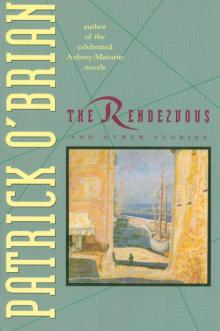 The Rendezvous and Other Stories
The Rendezvous and Other Stories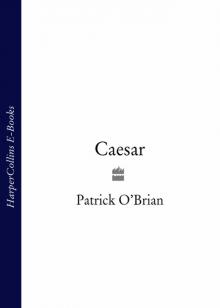 Caesar: The Life Story of a Panda-Leopard
Caesar: The Life Story of a Panda-Leopard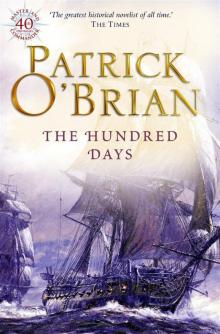 The Hundred Days
The Hundred Days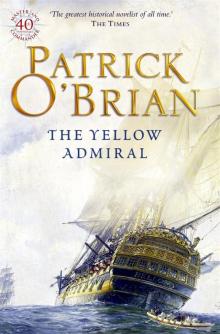 The Yellow Admiral
The Yellow Admiral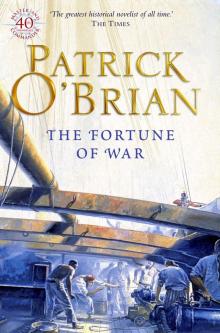 The Fortune of War
The Fortune of War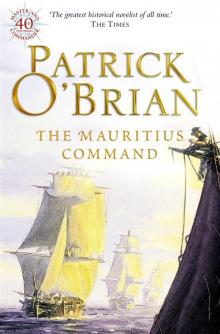 The Mauritius Command
The Mauritius Command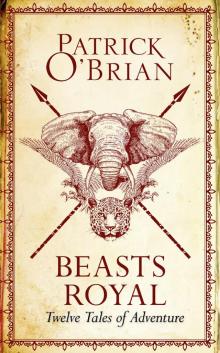 Beasts Royal: Twelve Tales of Adventure
Beasts Royal: Twelve Tales of Adventure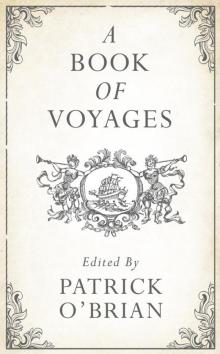 A Book of Voyages
A Book of Voyages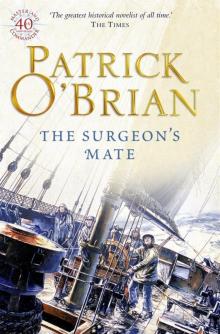 The Surgeon's Mate
The Surgeon's Mate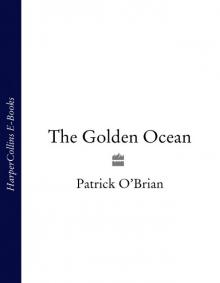 The Golden Ocean
The Golden Ocean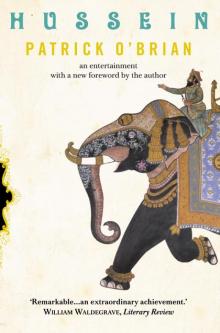 Hussein: An Entertainment
Hussein: An Entertainment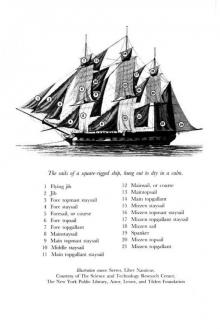 H.M.S. Surprise
H.M.S. Surprise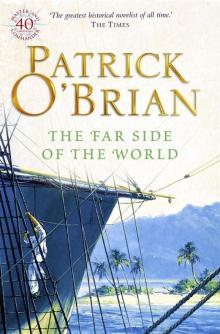 The Far Side of the World
The Far Side of the World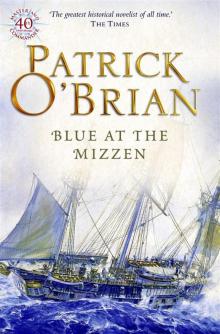 Blue at the Mizzen
Blue at the Mizzen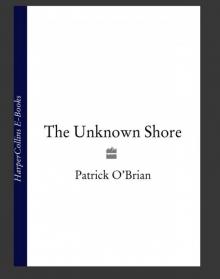 The Unknown Shore
The Unknown Shore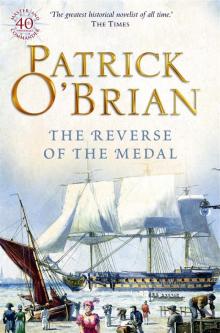 The Reverse of the Medal
The Reverse of the Medal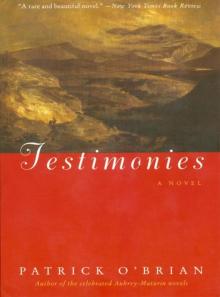 Testimonies
Testimonies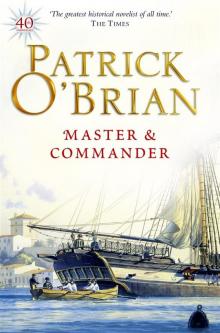 Master and Commander
Master and Commander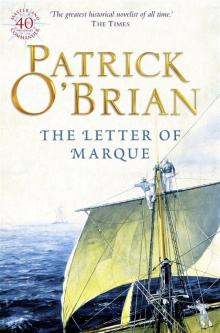 The Letter of Marque
The Letter of Marque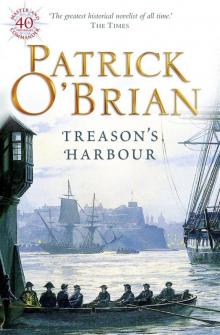 Treason's Harbour
Treason's Harbour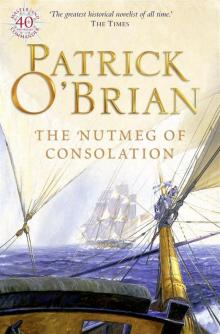 The Nutmeg of Consolation
The Nutmeg of Consolation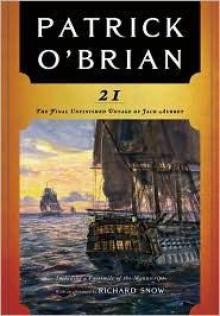 21: The Final Unfinished Voyage of Jack Aubrey
21: The Final Unfinished Voyage of Jack Aubrey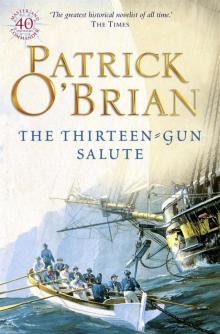 The Thirteen-Gun Salute
The Thirteen-Gun Salute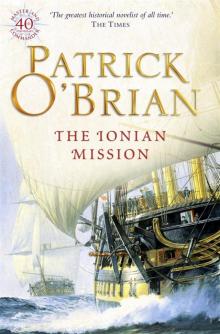 The Ionian Mission
The Ionian Mission Men-of-War
Men-of-War The Commodore
The Commodore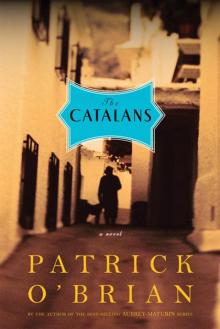 The Catalans
The Catalans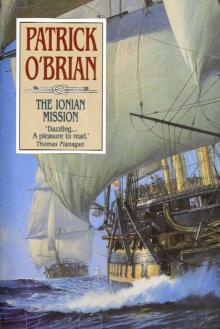 Aub-Mat 08 - The Ionian Mission
Aub-Mat 08 - The Ionian Mission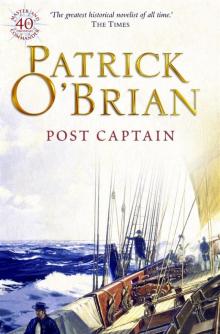 Post Captain
Post Captain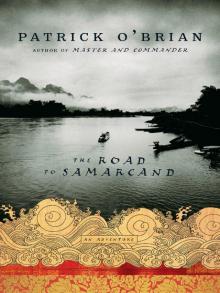 The Road to Samarcand
The Road to Samarcand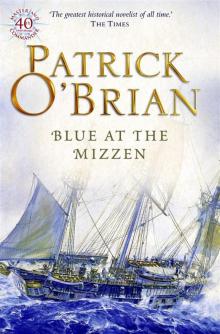 Book 20 - Blue At The Mizzen
Book 20 - Blue At The Mizzen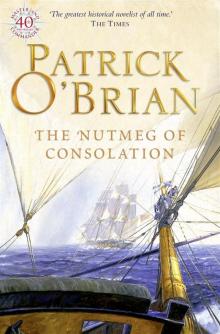 Book 14 - The Nutmeg Of Consolation
Book 14 - The Nutmeg Of Consolation Caesar
Caesar The Wine-Dark Sea
The Wine-Dark Sea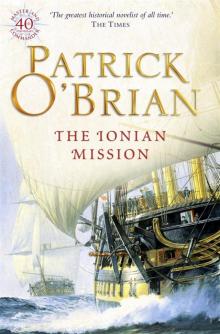 Book 8 - The Ionian Mission
Book 8 - The Ionian Mission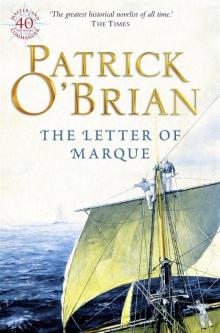 Book 12 - The Letter of Marque
Book 12 - The Letter of Marque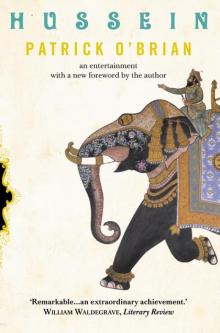 Hussein
Hussein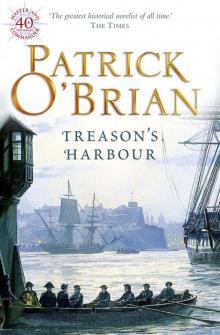 Book 9 - Treason's Harbour
Book 9 - Treason's Harbour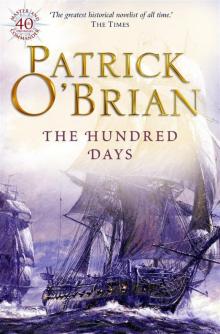 Book 19 - The Hundred Days
Book 19 - The Hundred Days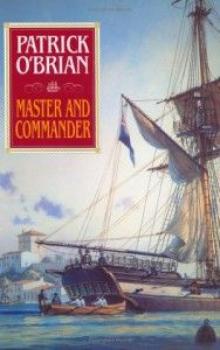 Master & Commander a-1
Master & Commander a-1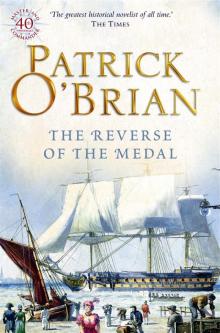 Book 11 - The Reverse Of The Medal
Book 11 - The Reverse Of The Medal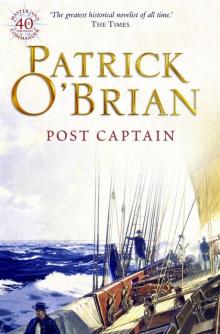 Book 2 - Post Captain
Book 2 - Post Captain The Truelove
The Truelove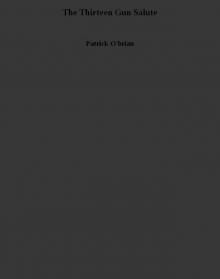 The Thirteen Gun Salute
The Thirteen Gun Salute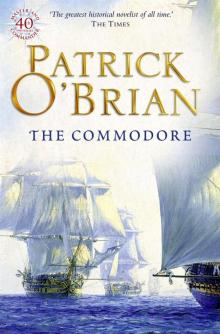 Book 17 - The Commodore
Book 17 - The Commodore The Final, Unfinished Voyage of Jack Aubrey
The Final, Unfinished Voyage of Jack Aubrey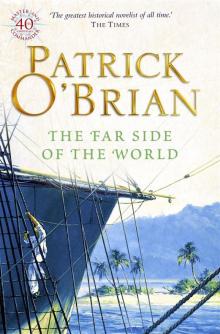 Book 10 - The Far Side Of The World
Book 10 - The Far Side Of The World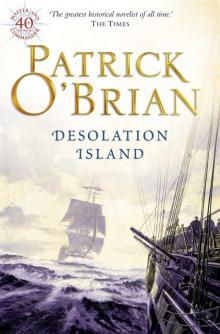 Book 5 - Desolation Island
Book 5 - Desolation Island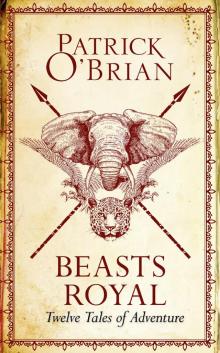 Beasts Royal
Beasts Royal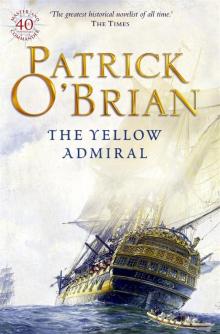 Book 18 - The Yellow Admiral
Book 18 - The Yellow Admiral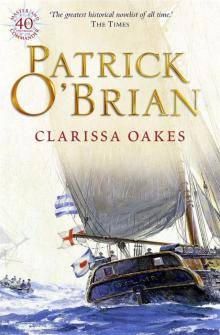 Book 15 - Clarissa Oakes
Book 15 - Clarissa Oakes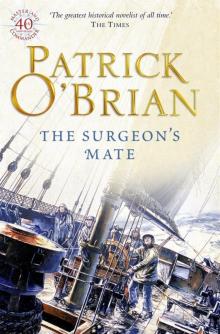 Book 7 - The Surgeon's Mate
Book 7 - The Surgeon's Mate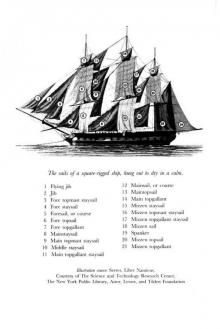 Book 3 - H.M.S. Surprise
Book 3 - H.M.S. Surprise Desolation island
Desolation island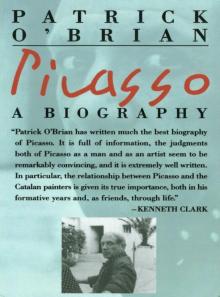 Picasso: A Biography
Picasso: A Biography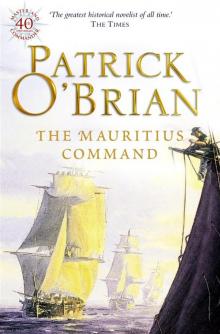 Book 4 - The Mauritius Command
Book 4 - The Mauritius Command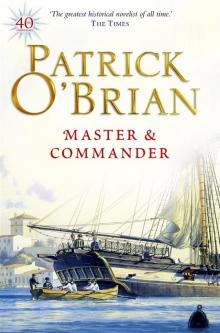 Book 1 - Master & Commander
Book 1 - Master & Commander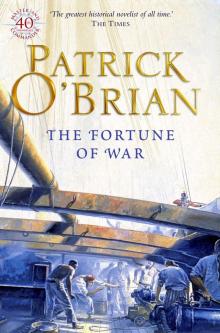 Book 6 - The Fortune Of War
Book 6 - The Fortune Of War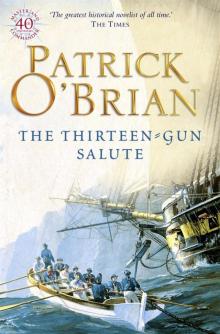 Book 13 - The Thirteen-Gun Salute
Book 13 - The Thirteen-Gun Salute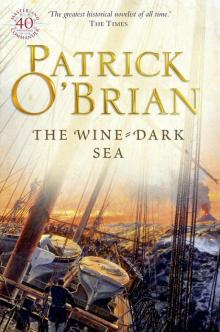 Book 16 - The Wine-Dark Sea
Book 16 - The Wine-Dark Sea